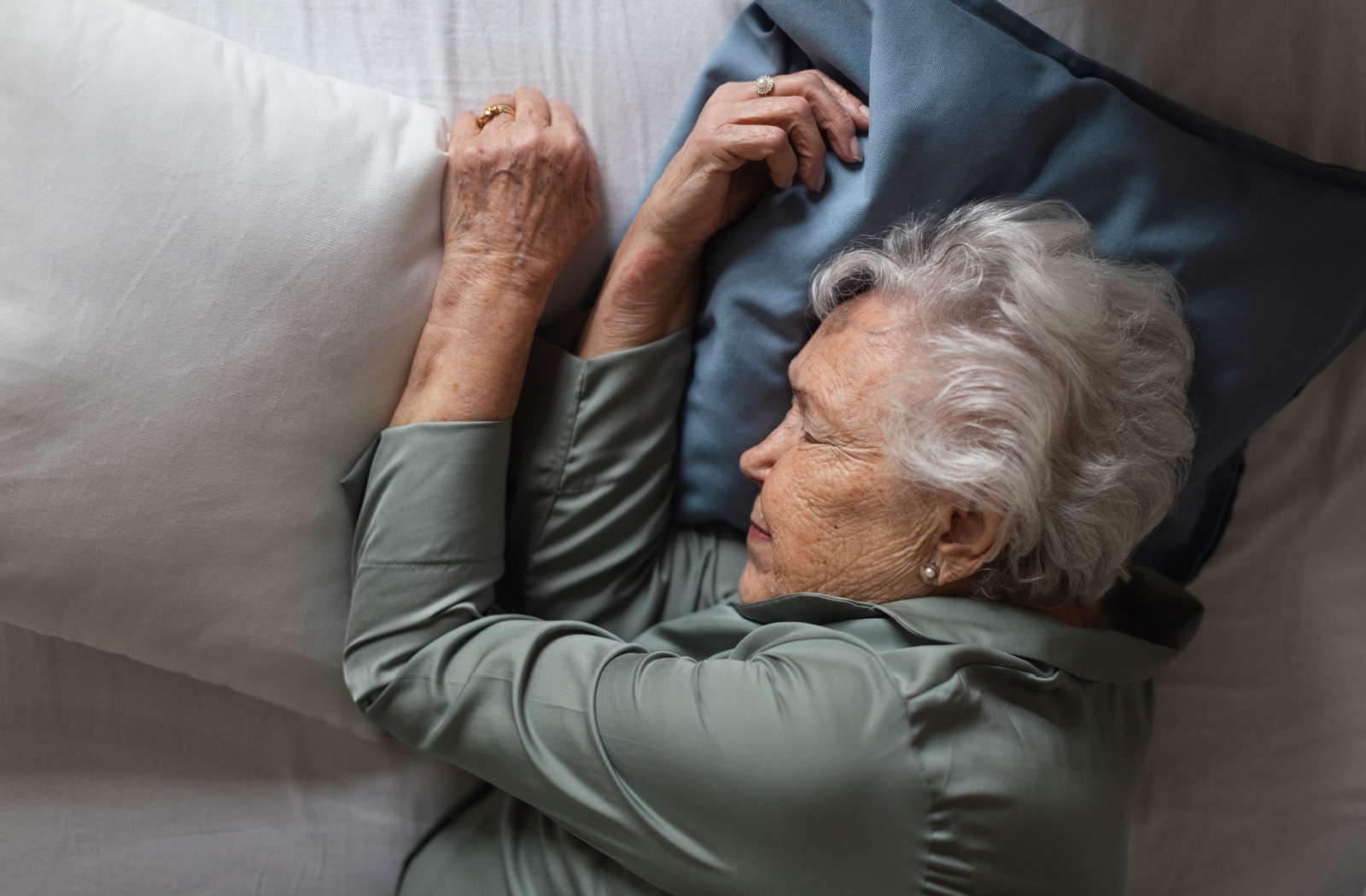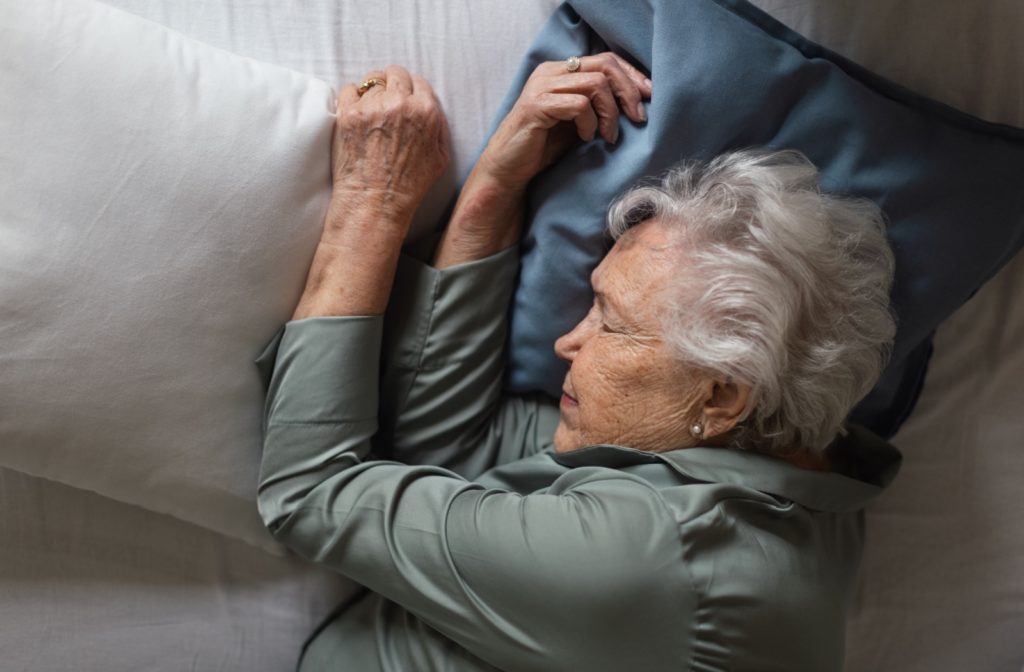As we age, it’s not unusual for sleep patterns to change. Many elderly people find themselves sleeping more than they did in their younger years, which can sometimes be a cause for concern.
While this is often a natural part of aging, there are several factors that contribute to why elderly people sleep so much, such as changes in sleep cycles, underlying health conditions, medications, and lifestyle shifts. Understanding these factors can help family members, caregivers, and seniors themselves manage their sleep habits and improve overall quality of life.
Natural Aging and Sleep Changes
One of the most common reasons elderly people sleep so much is due to changes in their sleep architecture as they age. As we grow older, our bodies experience a shift in how we sleep. Older adults often have a lighter, more fragmented sleep cycle. This means they spend less time in deep, restorative sleep and may wake up more frequently during the night. The result is often increased fatigue during the day, which leads to more frequent napping or longer sleep periods in an attempt to compensate for lost rest.
Sleep Cycles and Aging
In younger years, the body naturally enters deep sleep, which is crucial for physical and mental recovery. However, as we age, the time spent in deep sleep declines, and sleep becomes more fragmented. This lack of deep, restorative rest can lead to daytime sleepiness and the need for more sleep to feel rested. Additionally, seniors may experience earlier sleep onset, leading to earlier wake times, which can affect the overall sleep duration.
Common Health Conditions and Their Impact on Sleep
As elderly people age, they often face health challenges that can contribute to excessive sleep. Chronic conditions such as arthritis, diabetes, heart disease, and respiratory issues can create discomfort, making it difficult to sleep soundly through the night. For example, chronic pain from arthritis or muscle stiffness can cause frequent wake-ups and difficulty finding a comfortable position.
Neurological Conditions and Sleep Disruptions
Neurological diseases like Alzheimer’s and Parkinson’s disease can also play a role in why elderly people sleep so much. These conditions can interfere with the brain’s ability to regulate sleep patterns, leading to disrupted sleep schedules. In some cases, people with dementia or other cognitive impairments may experience increased daytime drowsiness as a result of difficulty maintaining a normal circadian rhythm.
Medications and Their Effects on Sleep
For many elderly individuals, managing multiple health conditions means taking several medications. While these medications help manage chronic diseases, they can also affect sleep. Some medications prescribed for conditions like hypertension, depression, or anxiety can have sedative effects that may lead to excessive daytime sleep. On the other hand, certain medications can disrupt sleep by causing insomnia or restlessness.
Medication Side Effects
It’s important for seniors and their caregivers to regularly review medications with their healthcare provider. Some medications may have side effects that contribute to excessive sleep or nighttime wakefulness. Working with a healthcare professional to adjust medications or explore alternative treatments can help mitigate sleep disturbances caused by prescriptions.
The Impact of Lifestyle Changes on Sleep
Retirement, changes in daily routines, and reduced social engagement can all contribute to why elderly people sleep so much. Without the structure of a job, many seniors find themselves staying up later and sleeping in, leading to irregular sleep patterns. Additionally, a more sedentary lifestyle in retirement can result in feelings of lethargy and the need for more sleep.
Lack of Physical Activity
Physical activity plays an important role in regulating sleep, but many elderly people may engage in less physical exercise due to mobility issues, discomfort, or simply because of a decrease in activity levels after retirement. Exercise helps to alleviate stress, improve mood, and regulate the sleep-wake cycle, all of which can lead to better, more restful sleep.

Strategies to Improve Sleep Quality for Seniors
While it’s natural for sleep patterns to change with age, there are several ways that seniors can enhance the quality of their sleep and manage excessive daytime sleepiness. Small adjustments in daily habits and routines can help seniors feel more rested and energized throughout the day.
1. Maintain Consistency
One of the best ways to regulate sleep is by maintaining a consistent sleep schedule. Going to bed and waking up at the same time each day helps the body establish a regular sleep-wake cycle, making it easier to fall asleep and wake up naturally.
2. Create a Sleep-Friendly Environment
A restful sleep environment is key to improving sleep quality. Seniors should aim to make their bedroom quiet, dark, and cool. A comfortable mattress and supportive pillows can help alleviate aches and pains that may interfere with sleep. Additionally, reducing noise and light in the room can promote deeper, more restful sleep.
3. Limit Daytime Naps
Although daytime napping is common for seniors, excessive napping can interfere with nighttime sleep. If naps are necessary, they should be kept short—around 20-30 minutes—and not taken too late in the afternoon to avoid disrupting nighttime sleep.
4. Stay Active During the Day
Engaging in regular physical activity is one of the most effective ways to improve sleep. Seniors should aim for light to moderate exercises, such as walking, swimming, or stretching, to promote better sleep. However, it’s important to avoid vigorous activity close to bedtime, as it can have the opposite effect and make falling asleep more difficult.
5. Mind Diet and Hydration
Eating a balanced diet and staying hydrated throughout the day can also impact sleep quality. Avoid heavy meals, caffeine, and alcohol close to bedtime, as these can disrupt sleep. Staying hydrated is important, but seniors should try to limit fluid intake in the evening to avoid frequent trips to the bathroom during the night.
How Sterling Pointe Senior Living Supports Residents
At Sterling Pointe Senior Living in Princeton, MN, we understand the complexities of sleep for elderly residents. Our community is designed to create a supportive environment where seniors can thrive, including offering personalized care plans that help regulate sleep patterns. With 24/7 care services, tailored medication management, and activities that encourage both mental and physical wellness, we aim to help each resident maintain optimal health and restful sleep. Reach out to us today to learn more about how we can help your loved one thrive.



